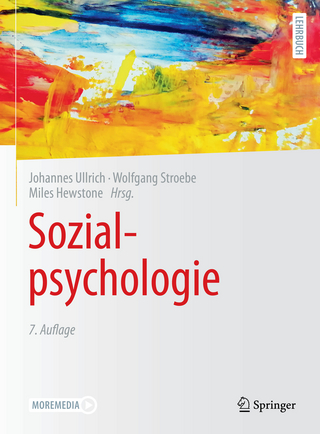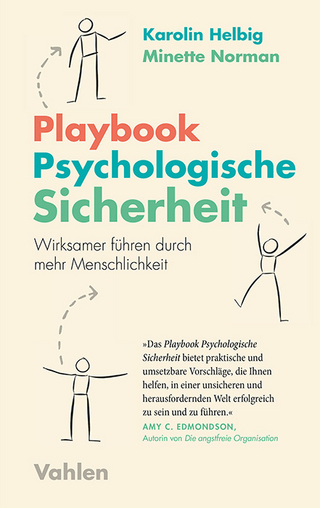
The Oxford Handbook of Positive Organizational Scholarship
Oxford University Press Inc (Verlag)
978-0-19-973461-0 (ISBN)
Positive Organizational Scholarship (POS) is an umbrella concept used to emphasize what elevates and what is inspiring to individuals and organizations by defining the possibilities for positive deviance rather than just improving on the challenging, broken, and needlessly difficult. Just as positive psychology explores optimal individual psychological states rather than pathological ones, POS focuses attention on the generative dynamics in organizations that lead to the development of human strength, foster resiliency in employees, enable healing and restoration, and cultivate extraordinary individual and organizational performance. While POS does not ignore dysfunctional or typical patterns of behavior, it is most interested in the motivations and effects associated with remarkably positive phenomena--how they are facilitated, why they work, how they can be identified, and how organizations can capitalize on them.
This handbook is the first major resource for scholars and professionals interested in learning about POS. Across 80 chapters, authors comprehensively review basic principles, empirical evidence, and ideas for future research relating to POS. They focus on using a positive lens to address problems and challenges in organizational life and they draw on POS to expand the domain of other disciplines including ethics, economics, peace, spirituality, social movements, and sustainability. This volume is an ideal resource for organizational scholars, students, practitioners, human resource managers, and professional associations, with coverage of the full spectrum of organizational theories and outcomes that define, explain, and predict the occurrence, causes, and consequences of positivity.
Kim S. Cameron, Ph.D., is William Russell Kelly Professor of Management and Organization at the Ross School of Business and Professor of Higher Education in the School of Education at the University of Michigan. Gretchen M. Spreitzer, Ph.D., is Area Chair and Professor of Management and Organizations at the Ross School of Business at the University of Michigan.
Contents ; 1. Introduction ; What is Positive about Positive Organizational Scholarship? ; Kim C. Cameron and Gretchen M. Spreitzer ; Part One: Positive Individual Attributes ; 2. Psychological Capital ; Psychological Capital: Meaning, Findings, and Future Directions ; Carolyn M. Youssef and Fred Luthans ; 3. Prosocial Motivation ; Prosocial motivation at work: When,When, Why and How Making a Difference Makes a Difference? ; Adam M. Grant and Justin M. Berg ; 4. Callings in Work ; Callings ; Amy Wrzesniewski ; 5. Work Engagement ; Being There: Work Engagement and Positive Organizational Scholarship ; Nancy P. Rothbard and Shefali V. Patil ; 6. Positive Identity ; Positive Identity Construction: Insights from Classical and Contemporary Theoretical Perspectives ; Laura Morgan Roberts and Stephanie J. Creary ; 7. Proactivity ; Proactivity in the Workplace: Looking Back and Looking Forward ; Chiahuei Wu and Sharon K. Parker ; 8. Creativity ; Striving for Creativity: Building Positive Contexts in the Workplace ; Jing Zhou and Run Ren ; 9. Curiosity ; Organizing the Cat? Generative Aspects of Curiosity in Organizational Life ; Spencer Harrison ; 10. Positive Traits ; Some Traits Associated with Flourishing at Work ; Joyce E. Bono, Stacy E. Davies and Rena L. Rasch ; 11. The Neuroscience Underpinning of POS ; Exploring the Minds of Managers: Insights from Three Neuroscience Studies ; Richard P. Bagozzi and Willem Verbeke ; Part Two: Positive Emotions ; 12. Positive Energy ; Human Energy in Organizations: Implications for POS From Six Interdisciplinary Streams ; Gretchen M. Spreitzer, Chak Fu Lam and Ryan W. Quinn ; 13. Positive Emotions ; Positive emotions: Broadening and Building Upward Spirals of Sustainable Enterprises ; Leslie E. Sekerka, Tanya Vacharkulksemsuk and Barbara L. Fredrickson ; 14. Subjective Well-being ; Subjective Well-being in Organizations ; Arnold B. Bakker and Wido G.M. Oerlemans ; 15. Passion ; Passion ; Kimberly H. Perttula and Melissa S. Cardon ; 16. Emotional Intelligence ; Social Context and the Psychology of Emotional Intelligence: A Key to Creating Positive Organizations ; Oscar Ybarra, Laura Rees, Ethan Kross, and Jeffrey Sanchez-Burks ; 17. Group Emotions ; Shared Positive Affect in Workgroups ; Seung-Yong Rhee and Hye Jeong Yoon ; Part Three: Strengths and Virtues ; 18. Virtuousness ; Virtuousness in Organizations ; Kim S. Cameron and Bradley Winn ; 19. Forgiveness ; Forgiveness at Four Levels: Intrapersonal, Relational, Organizational, and Collective-Group ; David S. Bright and Julie J. Exline ; 20. Humility ; Exploring the Relevant and Implications of Humility in Organizations ; Bradley P. Owens, Wade C. Rowatt, and Alan L. Wilkins ; 21. Compassion ; Compassion Revealed: What We Know About Compassion at Work (and Where We Need to Know More) ; Jacoba M. Lilius, Jason Kanov and Jane E. Dutton ; 22. Hope ; Imagining Hope in Organizations: From Individual Goal-Attainment to Horizons of Relational Possibility ; Arne Carlsen, Aina Landsverk Hagen and Tord F. Mortensen ; 23. Courage ; Courage in Organizations: An Integrative Review of the "Difficult Virtue" ; Monica C. Worline ; 24. Justice ; A Positive Lens on Organizational Justice: Toward a Moral, Constructive, and Balanced Approach to Reactions to Third-Party (In)Justice ; David M. Mayer ; 25. Integrity ; Research on Behavioral Integrity: A Promising Construct for Positive Organizational Scholarship ; Tony Simons, Edward C. Tomlinson and Hannes Leroy ; 26. Positive Ethics ; Positive Business Ethics: Grounding and Elaborating a Theory of Good Works ; Jason M. Stansbury and Scott Sonenshein ; 27. Leveraging Strengths ; Productivity through Strength ; Jim Asplund and Nikki Blacksmith ; 28. Character Strengths in Global Managers ; The Positive Power of Character Strengths and Virtues for Global Leaders ; Armenio Rego, Stewart Clegg and Miguel Pinha e Cunha ; Part Four: Positive Relationships ; 29. High Quality Connections ; High Quality Connections ; John Paul Stephens, Emily Heaphy and Jane E. Dutton ; 30. Relational Coordination ; New Directions for Relational Coordination Theory ; Jody Hoffer Gittell ; 31. Reciprocity ; A Dual Model of Reciprocity in Organizations: Moral Sentiments and Reputation ; Wayne Baker ; 32. Intimacy ; Workplace Intimacy in Leader-Follower Relationships ; Ronit Kark ; 33. Civility ; Civility ; Christine L. Porath ; 34. Trust ; POS and Trust in Leaders ; Aneil K. Mishra and Karen E. Mishra ; 35. Trustworthiness ; Perspective Taking: Building Positive Interpersonal Connections and Trustworthiness One Interaction at a Time ; Michele Williams ; 36. Humor ; The Laughter Advantage: Cultivating High Quality Connections and Workplace Outcomes Through Humor ; Cecily D. Cooper and John Sosik ; 37. Psychological Safety ; Psychological Safety: A Foundation for Speaking Up, Collaboration, and Experimentation in Organizations ; Ingrid M. Nembhard and Amy C. Edmondson ; Part Five: Positive Human Resource Practices ; 38. Career Development ; Personal Growth Through Career Work: A Positive Approach to Careers ; Douglas T. Hall and Mireia Las Heras ; 39. Mentoring ; Relational Mentoring: A Positive Approach to Mentoring at Work ; Belle Rose Ragins ; 40. Socialization ; Socialization Perspectives and Positive Organizational Scholarship ; Blake E. Ashforth, Karen K. Myers and David M. Sluss ; 41. Diversity ; A Positive Approach to Studying Diversity in Organizations ; Lakshmi Ramarajan and David Thomas ; 42. Communication ; The Role of Communication in Positive Organizational Scholarship ; Larry D. Browning, G.H. Morris and Kerk F. Kee ; 43. Conflict Resolution ; Parallel and Divergent Predictors of Objective and Subjective Value in Negotiation ; Jared R. Curhan and Ashley D. Brown ; 44. Negotiating ; The Mindful Negotiator: Strategic Emotion Management and Wellbeing ; Shirli Kopelman, Orli Avi-Yonah and Akshaya K. Varghese ; 45. Work-Family Dynamics ; Positive Work-Family Dynamics ; Jessica Keeney and Remus Ilies ; Part Six: Positive Organizational Practices ; 46. Symbolism in Organizations ; The Generative Potency of Organizational Symbols: Implications for Positive Organizational Scholarship ; Mary Ann Glynn and Lee Watkiss ; 47. Resourcefulness ; Resources, Resourcing, and Ampliative Cycles in Organizations ; Martha Feldman and Monica Worline ; 48. Collective Efficacy ; Collective Efficacy Beliefs, Organizational Excellence, and Leadership ; Roger D. Goddard and Serena J. Salloum ; 49. The Design of Work ; The Design of Jobs: A Strategy for Enhancing the Positive Outcomes of Individuals at Work ; Greg R. Oldham ; 50. Mindful Organizing ; Mindful Organizing: Establishing and Extending the Foundations of Highly Reliable Performance ; Timothy J. Vogus ; 51. Organizational Identity ; The Defining Role of Organizational Identity for Facilitating Stakeholder Flourishing: A Map for Future Research ; Celia V. Harquail and Shelley L. Brickson ; 52. Organizational Energy ; Organizational Energy ; Bernd Vogel and Heike Bruch ; 53. Innovation ; Innovativeness as Positive Deviance: Identifying and Operationalizing the Attributes, Functions and Dynamics that Create Growth ; Jeff DeGraff and Dan Nathan-Roberts ; 54. Organizational Boundaries ; Margins, Membership, and Mobility: Re-defining Boundaries in Collaborative Endeavors ; Rebekah Dibble and Cristina B. Gibson ; Part Seven: Positive Leadership and Change ; 55. Organizational Development ; The Spirits of Organization Development or Why OD Lives Despite Its Pronounced Death ; Jean M. Bartunek and Richard W. Woodman ; 56. Appreciative Inquiry ; Positive Organizational Development: Innovation-Inspired Change in an Economy and Ecology of Strengths ; David L. Cooperrider and Lindsey N. Godwin ; 57. Positive Change Attributes ; Seeing and Acting Differently: Positive Change in Organizations ; Robert E. Quinn and Ned Wellman ; 58. Implementing Positive Change ; What Makes an Organizational Change Process Positive? ; Karen Golden-Biddle and Jina Mao ; 59. Authentic Leadership ; Advances in Theory and Research on Authentic Leadership ; Bruce J. Avolio and Ketan Mhatre ; 60. Leadership Development ; Toward a Positive and Dynamic Theory of Leadership Development ; D. Scott DeRue and Kristina M. Workman ; 61. Peak Performance ; Organizational Sustainability: Organization Design and Senior Leadership to Enable Strategic Paradox ; Wendy K. Smith, Marianne W. Lewis and Michael L. Tushman, ; 62. Strategic Change ; Emotions and Strategic Change ; Quy Nguyen Huy ; 63. Strengths-Based Strategy ; Positive Strategy: Creating and Sustaining Strengths-Based Strategy That SOARs and Performs ; Lynn Perry Wooten and Jacqueline M. Stavros ; Part Eight: A Positive Lens on Problems and Challenges ; 64. Managing the Unexpected ; Managing the Unexpected ; Kathleen M. Sutcliffe and Marlys K. Christianson ; 65. Healing After Trauma ; Organizational Healing: A Relational Process to Handle Major Disruption ; Edward H. Powley ; 66. Organizational Recovery ; Recovery: Non-Work Experiences that Promote Positive States ; Sabine Sonnentag, Cornelia Niessen and Angela Neff ; 67. Responding to Crisis ; Orientations of Positive Leadership in Times of Crisis ; Erika Hayes James and Lynn Perry Wooten ; 68. Resilience Under Adversity ; Resilience at Work: Building Capability in the Face of Adversity ; Brianna Barker Caza and Laurie P. Milton ; 69. Post-traumatic Growth ; Post-traumatic growth: A Missed Opportunity for Positive Organizational Scholarship ; Sally Maitlis ; 70. Ambivalence ; Just a Good Place to Visit? Exploring Positive Responses to Psychological Ambivalence ; Michael G. Pratt and Camille Pradies ; 71. Responding to Stress ; Stress Interventions versus Positive Interventions: Apples and Oranges? ; Caroline Biron and Cary L. Cooper with Philip Gibbs ; Part Nine: Expanding Positive Organizational Scholarship ; 72. Sustainability ; Positive Deviance for a Sustainable World: Linking Sustainability and Positive Organizational Scholarship ; Andrew J. Hoffman and Nardia Haigh ; 73. Critical Theory ; Critical Studies and POS ; Arran Caza and Brigid Carroll ; 74. Economic Models ; Strange Bedfellows: Homo Economicus and Positive Organization Scholarship ; Paul C. Godfrey ; 75. Social Movements ; Social Movements in Organizations ; Debra Guckenheimer ; 76. Spirituality ; In God We Trust: A Comparison of Spiritualities at Work ; Lloyd E. Sandelands ; 77. Positive Deviance ; Positive Deviance: A Metaphor and Method for Learning from the Uncommon ; Marc Lavine ; 78. International Peacemaking ; Five Steps Toward Peace Making: Using Positive Organizational Scholarship to Build a Better World ; J. B. Ritchie and Scott C. Hammond ; 79. Conclusion ; A Path Forward: Assessing Progress and Exploring Core Questions for the Future of Positive Organizational Scholarship ; Gretchen M. Spreitzer and Kim C. Cameron
| Erscheint lt. Verlag | 8.9.2011 |
|---|---|
| Reihe/Serie | Oxford Library of Psychology |
| Verlagsort | New York |
| Sprache | englisch |
| Maße | 254 x 191 mm |
| Gewicht | 2078 g |
| Themenwelt | Geisteswissenschaften ► Psychologie ► Arbeits- und Organisationspsychologie |
| Geisteswissenschaften ► Psychologie ► Sozialpsychologie | |
| Wirtschaft ► Betriebswirtschaft / Management | |
| ISBN-10 | 0-19-973461-5 / 0199734615 |
| ISBN-13 | 978-0-19-973461-0 / 9780199734610 |
| Zustand | Neuware |
| Haben Sie eine Frage zum Produkt? |
aus dem Bereich


